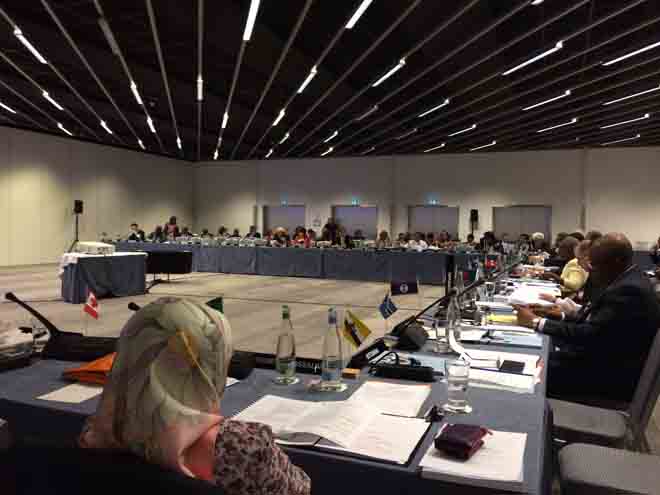Although some countries are unlikely to meet their Millennium Development Goals (MDGs) by 2015, the targets have brought about substantial improvements in key areas, such as reducing under-five and maternal mortality, and increasing immunisation coverage.
This was the view of Commonwealth health ministers attending the annual Commonwealth Health Ministers Meeting in Geneva, Switzerland in May. The meeting had the theme Commonwealth Post-2015 Health Agenda: Strengthening Health Policies and Systems.
Ministers noted that the MDGs had positioned health near the top of the development agenda and that the focus on under-five and maternal mortality, immunisation programmes, and access to TB and HIV treatment, meant that health in these areas had seen significant progress since the goals were established – even in countries that are unlikely to meet their targets by the cut-off date.
Malaysia’s Minister of Health, Datuk Seri Dr Subramaniam, said: “While there will be different levels of achievements of the Millennium Development Goals among our member countries, as a global entity we have to have targets and agendas.
“The main challenges that we face [in Malaysia] are non-communicable diseases and increasing lifespan and its effect on health costs. This will be our main issue post-2015.”
The three health MDGs are:
- MDG 4: Reduce by two-thirds, between 1990 and 2015, the under-five mortality rate
- MDG 5: Reduce by three-quarters, between 1990 and 2015, the maternal mortality ratio
- MDG 6: Halve AIDS transmission by 2015, begin to reverse the spread of HIV/AIDS and provide universal access to treatment; and halt, by 2015, and begin to reverse, the incidence of malaria and other major diseases
Ministers resolved to continue their commitment to accelerating progress in achieving these goals, while learning lessons from the MDG era. There was also an acknowledgement of the significant economic returns provided by investing in improving health and the high cost of inadequate health investment.
Prof C. O. Onyebuchi Chukwu, Minister of Health for Nigeria, said it was important to deal with the “unfinished business” of the MDGs, stressing how progress on health can be achieved by working across education, water and sanitation, agriculture and nutrition, among other sectors.
The meeting also saw the launch of Commonwealth Health Partnerships 2014, which assesses countries’ progress towards the MDGs, as well as examining critical issues in health care across the Commonwealth.
Ministers in attendance took advantage of the opportunity to share and exchange experiences in strengthening immunisation coverage, improving nutrition and anti-microbial resistance, as well as discussing the health-related challenges presented by climate change and the imperative of addressing these issues in the post-2015 development agenda.
They noted the need for continued collaboration and sharing of knowledge and expertise to support one another, and the work of the World Health Organization in this area.
Dr Philippos Patsalis, Minister of Health for Cyprus, said the Commonwealth meeting in Geneva, on the eve of the 67th World Health Assembly, was an important space for ministers to learn from one another. “We share different problems and different experiences, but we can gain from each other,” he said.
This sentiment was echoed by Mitcy Larue, Minister of Health for Seychelles, who described the meeting as a valuable forum to “share good practices” about successful health programmes.
Delegates expressed their appreciation for the role played by the Commonwealth Advisory Committee on Health (CACH) in providing advice to the Secretariat. Ministers noted the suggestions presented by CACH for strengthening its role, maximising the opportunities offered by the Commonwealth Health Ministers Meeting, and for enhancing ministerial interactions and exchanges.
Another discussion focused on universal health coverage and, while noting the challenges, acknowledged the need to ensure that all citizens have equitable access to high-quality, affordable health services when they require them, without having to endure financial hardship.
It was agreed by the ministers that ‘universal health coverage’ would be an appropriate theme for the 2015 Commonwealth Health Ministers Meeting and that the theme should include an emphasis on ageing and good health.
Commonwealth Health Partnerships 2014 is available from www.commonwealthofnations.org/publications






